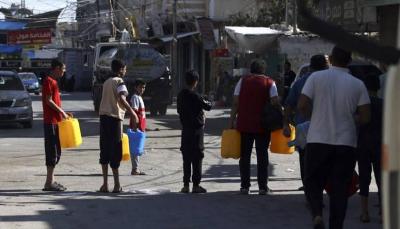Doctors in Gaza have noted that patients are arriving at hospitals with symptoms of illnesses resulting from overcrowding and poor health facilities after more than 1.4 million people have fled their homes to temporary shelters amid the most intense Israeli bombardment ever. Relief organizations have repeatedly warned of a health crisis in the densely populated Palestinian enclave, which is under an Israeli blockade that has cut off electricity, clean water, and fuel, with only small convoys of food and medicine from the United Nations arriving.
Nahid Abu Taima, a public health doctor at Nasser Hospital in Khan Younis, stated, "The overcrowding of citizens and the high number of people in schools make them susceptible to the spread of epidemics such as gastrointestinal infections, respiratory infections, and skin rashes, and this is why many citizens frequently visit the hospital for treatment for these diseases."
With the fuel needed to operate generators in all hospitals running out, doctors warn that vital equipment, such as incubators for newborns, is at risk of shutting down. The Gaza Health Ministry, run by Hamas, reported that around 40 medical centers have ceased operations as bombardment and displacement increase pressure on the health system.
The World Health Organization has warned that a third of hospitals in Gaza are non-operational. Rick Brennan, the Director of Emergency Programs at the WHO’s Eastern Mediterranean Regional Office, stated, “We are seeking approval for a continuous, expanded, and protected humanitarian operation.”
On Tuesday, the Indonesian hospital, the largest in northern Gaza, announced it has closed everything except for the last vital departments like the intensive care unit. The Palestinian Health Ministry reported that the only other hospital still serving patients in northern Gaza, Beit Hanoun Hospital, has ceased operations due to heavy bombing in the town.
Atef al-Kahlout, the director of the Indonesian hospital, said that if the hospital does not receive fuel, it would be a death sentence for patients in northern Gaza.
Abu Taima from Nasser Hospital stated that people have begun suffering from stomach pains, lung infections, and skin rashes in the temporary shelters where displaced Palestinians are crowded with their families, hoping to be safe from the bombs.
A pharmacy owner indicated that there is very little stock left. People have stocked up on over-the-counter medicines, but there are concerns about the possibility of running out of necessary medications for chronic illnesses.
As health concerns grow, the ongoing intense Israeli bombardment continues to cause most of the suffering in Gaza. After an airstrike in Khan Younis, Abdullah Tabash held the body of his daughter Sidra, refusing to let her go as he examined her blood-stained face and hair, saying he wants to look at her for as long as possible.
The aunt of twins Watin and Ahmad reported that they lost their mother in an Israeli airstrike in Khan Younis, and the infants (14 months old) are now separated, with Watin in the hospital while Ahmad is despairingly crying for his sister. Their mother, Amal Abu Mekhemer, was killed while breastfeeding Ahmad, who was shielded by her body from the worst of the explosion, while Watin suffered burns to her body.
Ahmad, whose wound was treated by paramedics, is in the care of his aunt, and Watin remains in the hospital appearing unable to recognize even her father, according to relatives. Alaa Abu Mekhemer, the twins' aunt, said that Ahmad at home misses his sister and cries all the time, noting the belief that twins can feel each other's presence. The bombardment has resulted in multiple fatalities.




